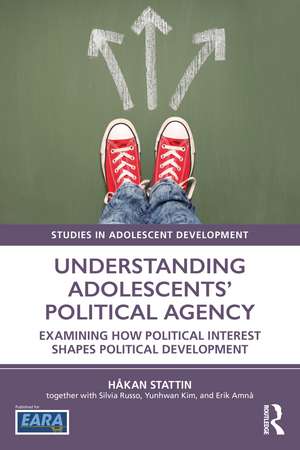Understanding Adolescents’ Political Agency: Examining How Political Interest Shapes Political Development: Studies in Adolescent Development
Autor Håkan Stattinen Limba Engleză Paperback – 7 iun 2024
Håkan Stattin explores the findings of an extensive longitudinal study of the political socialization of young people in Sweden from the ages of 13 to 28, which shows that, contrary to popular belief, it is not parents, peers, teachers or other key adults who are the primary agents in shaping young people's political development; it is their own self-directed political interest. Given that political interest is both an input and an output, the book examines how political interest affects young people's political interactions with their parents, and why young people and their parents perceive these interactions differently. It covers key issues such as the impact of political-interest-triggering events and civil unrest, the role of school and peers, parental involvement and the path from political interest to future political and civic engagement.
Launching a new field of research internationally, this volume is essential reading for researchers, students, educators, and policy developers interested in young people's political and civic attitudes, engagement, communication, core values and the emergence of intrinsic political sophistication.
| Toate formatele și edițiile | Preț | Express |
|---|---|---|
| Paperback (1) | 334.27 lei 22-36 zile | +23.53 lei 5-11 zile |
| Taylor & Francis – 7 iun 2024 | 334.27 lei 22-36 zile | +23.53 lei 5-11 zile |
| Hardback (1) | 1000.27 lei 43-57 zile | |
| Taylor & Francis – 7 iun 2024 | 1000.27 lei 43-57 zile |
Din seria Studies in Adolescent Development
-
 Preț: 459.71 lei
Preț: 459.71 lei - 17%
 Preț: 257.90 lei
Preț: 257.90 lei -
 Preț: 382.65 lei
Preț: 382.65 lei -
 Preț: 384.59 lei
Preț: 384.59 lei -
 Preț: 350.78 lei
Preț: 350.78 lei -
 Preț: 349.80 lei
Preț: 349.80 lei
Preț: 334.27 lei
Nou
Puncte Express: 501
Preț estimativ în valută:
63.97€ • 66.41$ • 53.34£
63.97€ • 66.41$ • 53.34£
Carte disponibilă
Livrare economică 03-17 martie
Livrare express 14-20 februarie pentru 33.52 lei
Preluare comenzi: 021 569.72.76
Specificații
ISBN-13: 9781032443553
ISBN-10: 1032443553
Pagini: 338
Ilustrații: 154
Dimensiuni: 156 x 234 x 22 mm
Greutate: 0.48 kg
Ediția:1
Editura: Taylor & Francis
Colecția Routledge
Seria Studies in Adolescent Development
Locul publicării:Oxford, United Kingdom
ISBN-10: 1032443553
Pagini: 338
Ilustrații: 154
Dimensiuni: 156 x 234 x 22 mm
Greutate: 0.48 kg
Ediția:1
Editura: Taylor & Francis
Colecția Routledge
Seria Studies in Adolescent Development
Locul publicării:Oxford, United Kingdom
Public țintă
Postgraduate and Undergraduate AdvancedCuprins
Part I. The Growth of Political Interest and Action 1. Changes in Political Interest and Civic/Political Activity 2. Plans for Future Civic Engagement Part II. Push and Pull of Political Interest 3. Young People's Attention to Politics 4. A Political Reputation Part III. Political Interactions With Parents 5. Political Interactions With Parents in Early and Mid-Adolescence 6. Political Interactions With Parents in Early Adulthood 7. Direction of Effects and Congruence Between Adolescents' and Parents' Views 8. Emotional Relationships and Transfers Across Contexts Part IV. "We Do Not See Things as They Are, We See Them as We Are" 9. Projection of Life Values and Political Discussions in Families 10. Openness to Others' Influence Part V. Why a Person-Oriented Approach Is Needed 11. Why Some Adolescents, but Not Others, Are Open to Their Parents' Political Communication 12. Politically Interested Adolescents Are Not a Homogeneous Group Part VI. What Have We Learned? 13. Tie the Threads Together
Notă biografică
Håkan Stattin is Professor of Psychology at Uppsala University, Sweden. He has conducted studies in many areas of adolescent development and has received awards from the European Association for Research on Adolescence (EARA), the European Association for Developmental Psychology (EADP), the Society for Research on Adolescence (SRA), and the International Society for the Study of Behavioral Development (ISSBD).
Descriere
This ground-breaking volume shows that young people largely shape their own political development, and that to understand young people's political development we must consider their political agency.
